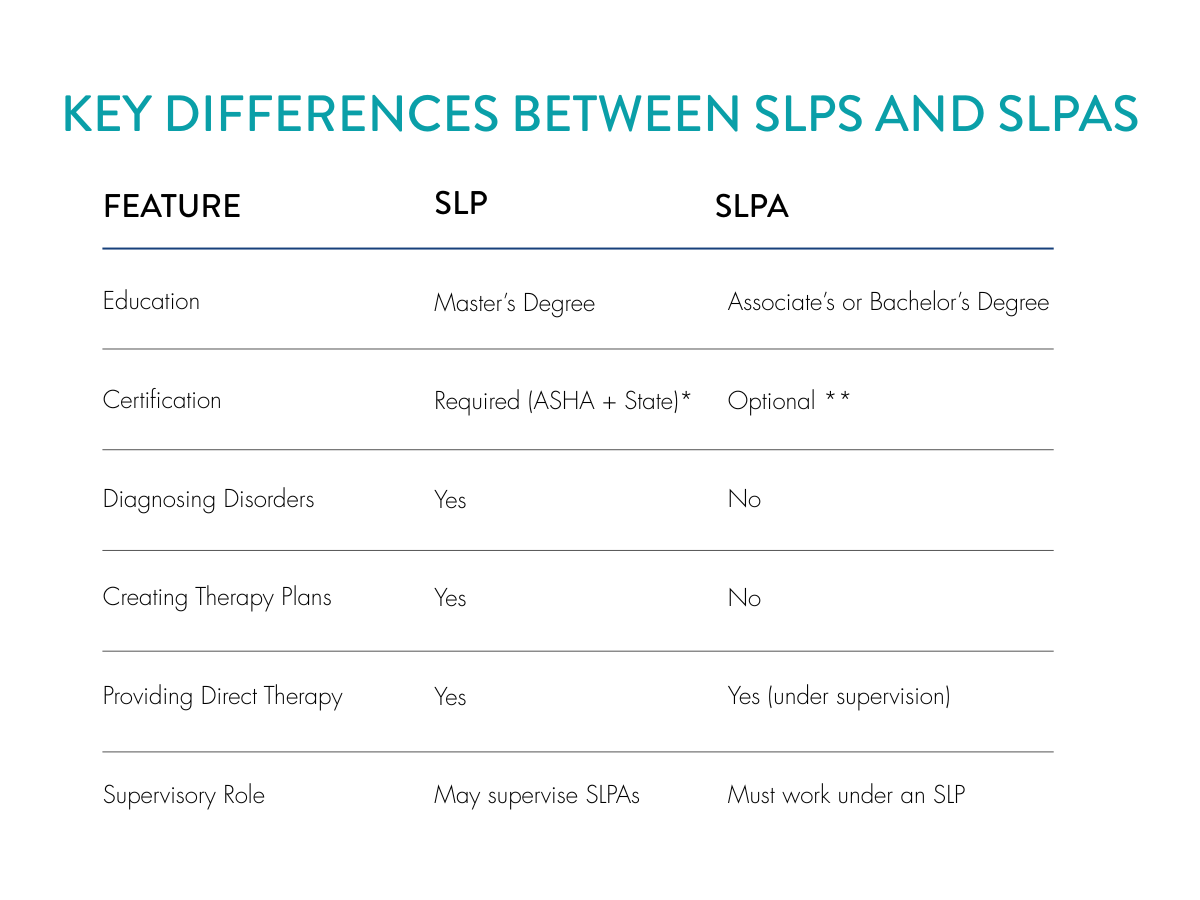What is an SLP? What is an SLPA? Here’s the Difference.
If you're just beginning to explore the world of speech therapy or are curious about different career paths in this field, you might be wondering: What exactly is an SLP, and how does it differ from an SLPA? While these two roles work closely together to support people with communication disorders, their responsibilities, education requirements, and scope of practice are quite different.
Let’s break it all down.
What is an SLP?
SLP stands for Speech-Language Pathologist. SLPs are licensed professionals who diagnose and treat communication and swallowing disorders. This includes difficulties with:
Articulation and speech sounds
Language comprehension and expression
Voice disorders
Fluency (e.g., stuttering)
Social communication
Feeding and swallowing
SLPs work in various settings, including schools, hospitals, private practices, teletherapy platforms, and clients' homes.
Education & Certification for SLPs:
Master’s degree in Communication Sciences and Disorders
Completion of a Clinical Fellowship Year (CFY)
National certification through the American Speech-Language-Hearing Association (ASHA)
State licensure
What is an SLPA?
SLPA stands for Speech-Language Pathology Assistant. SLPAs support SLPs by carrying out therapy plans under their supervision. They do not diagnose but help implement goals created by the SLP, track data, and assist in treatment.
Some of the things an SLPA might do:
Run one-on-one or group therapy sessions
Assist with articulation or language exercises
Prepare materials for sessions
Collect data and report progress to the supervising SLP
SLPAs are especially common in school settings and help extend services to more children by working closely with licensed SLPs.
Education & Certification for SLPAs:
Associate’s or bachelor’s degree in speech-language pathology or communication disorders
Supervised clinical fieldwork experience
Optional certification through ASHA's SLPA Certification program
Certification for SLPs*
Required National Certification – ASHA’s CCC-SLP
SLPs must earn the Certificate of Clinical Competence in Speech-Language Pathology (CCC-SLP) from the American Speech-Language-Hearing Association (ASHA). This credential verifies that the SLP has met national standards in:
Education: Completion of a Master’s degree in Speech-Language Pathology from an ASHA-accredited program.
Clinical Training: Completion of 400+ hours of supervised clinical practicum.
Clinical Fellowship (CF): A 36-week mentored professional experience after graduation.
Exam: Passing the Praxis Exam in Speech-Language Pathology.
Required State Licensure
In addition to the national certification, SLPs must obtain a license from the state where they plan to work. Each state has its own requirements, which usually include:
Proof of CCC-SLP or similar educational/clinical standards
Background checks
Fees and continuing education requirements to maintain the license
Important: You can’t legally practice as an SLP without a state license, even if you have your CCC-SLP.
Certification for SLPAS**
Optional: ASHA Assistants Certification
While not required in every state, the ASHA Assistants Certification (C-ASHA) is a national credential offered by the American Speech-Language-Hearing Association (ASHA) for qualified SLPAs.
What Does It Do?
Verifies your competency to work as an SLPA at a national level.
Shows employers you’ve met ASHA’s rigorous education, training, and ethics standards.
It may make you more competitive in the job market, especially in states or agencies that prefer certified assistants.
Requirements to Apply:
An associate’s or bachelor’s degree in speech-language pathology or communication sciences.
At least 100 hours of clinical fieldwork supervised by an ASHA-certified SLP.
Completion of required training modules from ASHA.
Passing the ASHA Assistants Certification Exam.
Good to Know:
Some states require state licensure only, some accept this national certification, and others may require both. Always check your local requirements!
Why Both Roles Matter
SLPs and SLPAs are both crucial to the success of speech therapy programs. Think of them as teams: the SLP is the strategist and diagnostician, while the SLPA is the coach who helps carry out the playbook with consistency, care, and creativity.
By working together, they make speech therapy more accessible and help improve outcomes for clients of all ages.
APA Speech Therapy Inc. is Hiring!
Are you a passionate SLP or SLPA looking to work in a collaborative, supportive environment that values creativity, communication, and care? APA Speech Therapy Inc is currently hiring!
Whether you're newly licensed or have years of experience, we'd love to hear from you. Our team is dedicated to empowering clients and providing high-quality, culturally responsive therapy services.
Click here to fill out our Join Our Team form, and someone from our team will contact you!

